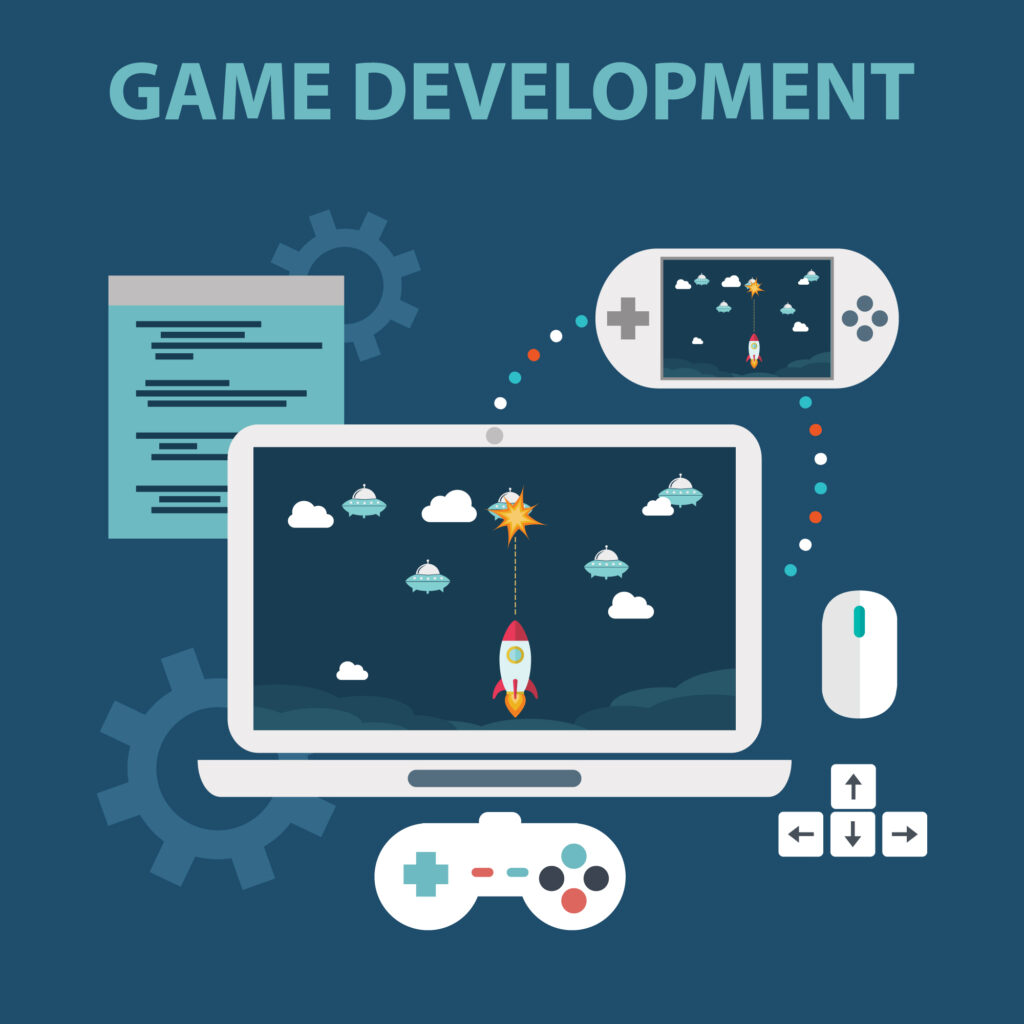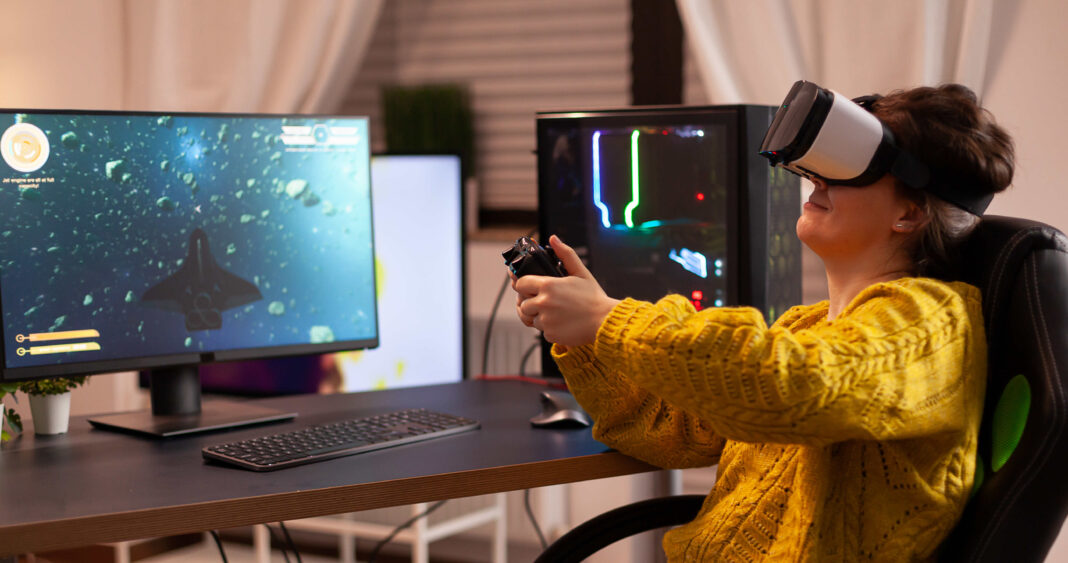Artificial Intelligence (AI) is transforming industries across the globe, and game development is no exception. From creating more realistic characters to streamlining production processes, AI is reshaping how games are designed, developed, and experienced. This article delves into the various ways AI is influencing game development, offering a detailed look at its impact on creativity, efficiency, and player engagement.

The Role of AI in Game Design
Procedural Content Generation
One of the most significant contributions of AI to game development is procedural content generation (PCG). This technology allows developers to create vast, complex game worlds without manually designing every detail. AI algorithms can generate terrain, levels, and even entire cities, saving time and resources. For example, games like “No Man’s Sky” use PCG to create an almost infinite universe with unique planets, flora, and fauna.
Intelligent Non-Player Characters (NPCs)
AI is also revolutionizing the behavior of non-player characters (NPCs). Traditional NPCs follow pre-scripted paths and actions, making them predictable and sometimes unrealistic. With AI, NPCs can now exhibit more complex behaviors, adapting to player actions and making decisions based on real-time data. This creates a more immersive and dynamic gaming experience. Games like “The Elder Scrolls V: Skyrim” and “Red Dead Redemption 2” have utilized AI to create NPCs that feel more lifelike and responsive.
Enhancing Game Development Efficiency
Automated Testing and Bug Detection
Game development is a complex process that often involves extensive testing to identify and fix bugs. AI-powered tools can automate this process, significantly reducing the time and effort required. These tools can simulate thousands of gameplay scenarios, identifying potential issues that human testers might miss. This not only speeds up the development cycle but also improves the overall quality of the game.
Streamlining Asset Creation
Creating game assets, such as textures, models, and animations, is a time-consuming task. AI can assist in this area by automating parts of the asset creation process. For instance, AI algorithms can generate realistic textures or animate characters based on motion capture data. This allows artists to focus on more creative aspects of game design, while AI handles the repetitive tasks.
Improving Player Experience
Personalized Gameplay
AI can analyze player behavior and preferences to offer personalized gameplay experiences. By tracking how players interact with the game, AI can adjust difficulty levels, suggest in-game purchases, or even modify the storyline to better suit individual players. This level of customization enhances player engagement and satisfaction, making games more enjoyable and replayable.
Real-Time Adaptation
AI enables games to adapt in real-time based on player actions. This can include changing the game environment, altering NPC behavior, or adjusting the narrative. For example, if a player consistently chooses aggressive actions, the game might respond by making NPCs more hostile or altering the storyline to reflect the player’s choices. This dynamic adaptation makes each playthrough unique and engaging.
AI in Game Marketing and Monetization
Predictive Analytics for Player Retention
AI can analyze vast amounts of data to predict player behavior and identify patterns that lead to player churn. By understanding what keeps players engaged, developers can implement strategies to improve retention. This might include offering targeted in-game rewards, personalized content, or timely notifications to re-engage players.
Dynamic Pricing and In-Game Purchases
AI can also optimize in-game purchases and pricing strategies. By analyzing player spending habits and preferences, AI can suggest personalized offers or adjust prices dynamically to maximize revenue. This approach ensures that players feel they are getting value for their money, while developers can increase their profitability.
Ethical Considerations in AI-Driven Game Development
Data Privacy and Security
As AI relies heavily on data, ensuring player privacy and security is paramount. Developers must implement robust data protection measures to safeguard player information. This includes encrypting data, obtaining explicit consent for data collection, and being transparent about how data is used.
Bias and Fairness
AI algorithms can inadvertently introduce bias into games, affecting player experiences. For example, if an AI system is trained on biased data, it might favor certain player behaviors or demographics. Developers must be vigilant in identifying and mitigating such biases to ensure fair and inclusive gameplay.
The Future of AI in Game Development
AI-Driven Storytelling
The future of AI in game development includes more advanced storytelling capabilities. AI could generate entire narratives based on player choices, creating a truly interactive and personalized story experience. This would allow for games that evolve uniquely for each player, offering endless replayability.
Collaborative AI and Human Creativity
AI is not here to replace human creativity but to augment it. By handling repetitive tasks and offering new tools for creativity, AI allows developers to focus on what they do best—creating compelling and innovative games. The collaboration between AI and human developers will likely lead to even more groundbreaking advancements in the industry.
Frequently Asked Questions (FAQ)
1. How does AI improve game graphics?
AI enhances game graphics by automating tasks like texture generation and character animation. It can also upscale lower-resolution images in real-time, providing higher-quality visuals without requiring more powerful hardware.
2. Can AI create entire games on its own?
While AI can assist in many aspects of game development, such as content generation and testing, it cannot yet create entire games independently. Human creativity and oversight are still essential for designing compelling narratives and gameplay mechanics.
3. What are the risks of using AI in game development?
The primary risks include data privacy concerns, potential biases in AI algorithms, and the possibility of over-reliance on AI, which could stifle human creativity. Developers must address these issues to ensure ethical and effective use of AI.
4. How does AI affect multiplayer games?
In multiplayer games, AI can enhance matchmaking by pairing players of similar skill levels, detect cheating, and manage in-game economies. It can also create more challenging and adaptive AI opponents for players to compete against.
5. Will AI replace game developers?
AI is unlikely to replace game developers entirely. Instead, it will serve as a tool to enhance their capabilities, allowing them to focus on more creative and complex aspects of game design while AI handles repetitive tasks.
Conclusion
AI is undeniably transforming the game development landscape, offering new tools and techniques that enhance creativity, efficiency, and player engagement. From procedural content generation to personalized gameplay, AI is enabling developers to create more immersive and dynamic gaming experiences. However, it is crucial to address ethical considerations and ensure that AI is used responsibly. As AI continues to evolve, its collaboration with human creativity will undoubtedly lead to even more innovative and exciting developments in the world of gaming.

